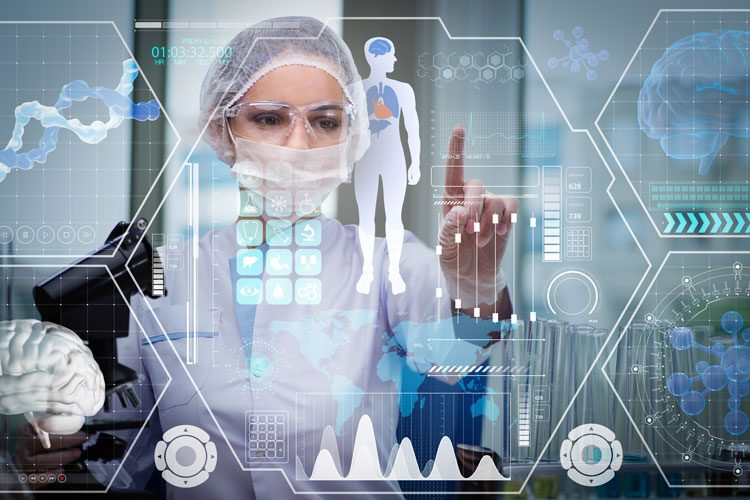AI in Medicine is rapidly transforming the landscape of healthcare, proving to be a potent force in reducing human suffering and enhancing patient outcomes. As artificial intelligence healthcare technology advances, its applications are becoming ubiquitous, influencing everything from diagnostics to treatment recommendations. Innovations in AI healthcare applications are reshaping medical education, equipping future physicians with tools that streamline learning and clinical practice. With a focus on AI patient care, these advancements promise to alleviate burdens on healthcare providers and create a more efficient system overall. As we push through this AI revolution, the implications for improving healthcare quality and accessibility are profound.
The integration of artificial intelligence in the medical field represents a groundbreaking shift in how healthcare is delivered and experienced. Often termed as healthcare technology advancements, these innovations leverage advanced algorithms to enhance patient interactions, support clinical decision-making, and optimize medical education. This new era of intelligent systems not only aims to empower healthcare professionals but also seeks to improve outcomes for patients across varied demographics. By embracing AI-driven solutions, we are poised to navigate and address critical challenges in modern medicine, ensuring a future where equitable access to quality care is a reality. Through careful implementation and consideration of potential biases, the collaboration between human expertise and algorithmic insights holds the promise of a revitalized healthcare system.
Transforming Patient Care with AI
Artificial Intelligence (AI) is poised to revolutionize the way healthcare providers interact with patients. With tools such as OpenEvidence, clinicians can quickly access vast amounts of medical literature during consultations, allowing for real-time, evidence-based decisions. This capability transforms traditional doctor-patient encounters, making them more efficient and informed. Doctors can now provide instant insights, dramatically improving the overall patient experience. This shift not only enhances the doctor’s ability to diagnose and treat but also builds a relationship of trust, as patients feel that their care is backed by the latest research and data.
Moreover, AI-driven applications can help tailor patient care by analyzing individual health histories and predicting potential health issues. In chronic disease management, AI can monitor patients’ progress and suggest necessary adjustments to their treatment plans, allowing for proactive care rather than reactive interventions. By ensuring that treatments align with the latest clinical guidelines and personal patient data, AI significantly improves patient outcomes and satisfaction. As AI technology continues to evolve, its integration into patient care promises an era where personalized medicine becomes the norm rather than the exception.
Frequently Asked Questions
What are the main applications of artificial intelligence in healthcare?
Artificial intelligence in healthcare has several applications including diagnostics, predictive analytics, personalized medicine, and administrative tasks automation. AI healthcare applications facilitate faster and more accurate diagnoses, improve patient care by tailoring treatments to individual needs, and reduce clinician workloads through effective automation of routine tasks.
How is AI transforming medical education?
AI is transforming medical education by integrating advanced technologies like virtual patients, AI-powered tutor bots, and analytics tools to enhance learning experiences. These innovations allow students to practice skills in simulated environments, ultimately preparing them better for real-world clinical encounters.
How does AI contribute to patient care in medical settings?
AI enhances patient care by providing healthcare professionals with decision support systems that analyze patient data quickly and accurately. AI patient care tools help identify potential health risks and suggest personalized treatment plans, improving overall patient outcomes and satisfaction.
What advancements in healthcare technology are driven by AI?
Advancements in healthcare technology driven by AI include the development of sophisticated diagnostic tools, machine learning algorithms for predictive analytics, and automated systems for patient management. These innovations help streamline healthcare processes, minimize errors, and contribute to more efficient care delivery.
What challenges does AI face in the field of medicine?
AI in medicine faces several challenges including data bias, the possibility of ‘hallucinations’ where AI generates inaccurate information, and concerns about the ethical implications of relying on AI in clinical decision-making. Addressing these challenges is crucial to ensure that AI technologies improve healthcare outcomes without compromising quality.
| Key Point | Description |
|---|---|
| Adam Rodman’s Experience | Rodman highlights the transition from manual research to AI-assisted insights in a matter of seconds, improving patient care. |
| Impact of AI in Medicine | Experts believe AI’s adoption could reshape human interactions in healthcare, reduce administrative burdens, and enhance clinical decision-making. |
| Optimism vs. Challenges | While AI promises better healthcare, there are concerns regarding biases, misinformation, and potential pitfalls in medical education. |
| AI’s Role in Patient Experience | AI can transform doctor-patient relationships by providing immediate second opinions and improving clinical outcomes. |
| Bias and Data Representation | AI systems need to account for the biases present in current data sets to avoid perpetuating existing inequalities in healthcare. |
Summary
AI in Medicine is poised to revolutionize healthcare by significantly enhancing the efficiency and quality of patient care. As technology evolves, its integration into medical practice promises to streamline workflows, improve accuracy in diagnoses, and foster better doctor-patient communication. However, while the potential benefits are immense, it is crucial to address the biases present in AI training data and ensure that medical education evolves to incorporate these advancements effectively. Ultimately, the responsible application of AI can create a more equitable healthcare system, benefiting patients and providers alike.
